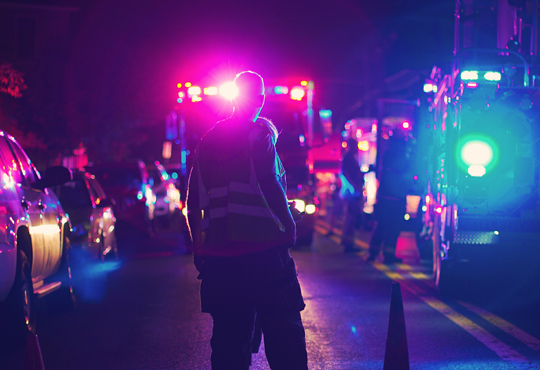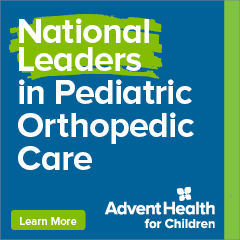On the Front Lines
A new wave of legislation and programs taking effect in Orange County will benefit first responders suffering from distress after traumatic events.
Gunfire crackled in the air as Orange County firefighter Donovan Reid* and his partner arrived at Pulse Nightclub on June 12, 2016. Expecting a call for something minor, nothing could have prepared them for the pure chaos they would encounter—unraveling just another typical day into a nightmare before their eyes.
Reid and his team were the first fire rescue team to arrive at the catastrophic scene. At that time, the police department was still unsure where the shooter was located, or if he was posing even more of a threat to the area with a bomb.
“When we got there, we were basically told where to park, which was in the intersection in front of the club and they just started putting people in our truck and telling us to drop them off at the hospital,” Reid says. “We were basically the shuttle back and forth from the scene to the hospital.”
After arriving at the hospital with the first group of victims, Reid and his partner had an opportunity to try and process the dire situation. After gathering their thoughts, the two had a conversation filled with fear as they discussed the dangers of going back to the scene. Quickly, they realized they were the only available rescue team in the area at that moment. It was no longer just their job, it became their moral responsibility.
“In my entire career, I’ve never had the feeling of, ‘OK. This is going to be the call I don’t go home from.’ That kind of hit hard,” says Reid.
By the end of the night, Reid and his fire rescue colleagues did away with their blood-ridden shirts the only way they knew how—a fire. Every day after that fateful night, while transporting other patients to the hospital, Reid and his team would drive by Pulse, forcing him to relive the tragedy repeatedly. Beginning to struggle with the fact that he couldn’t save everyone, Reid began slipping away from his normal routine. He stopped working out daily and everything about him began to change. While it was undoubtedly difficult for Reid at first, he has been doing much better and found some solace after talking openly with a therapist about the event.
In the aftermath of tragedies such as the Pulse and Parkland shootings, the Florida Legislature has been focused on helping first responders through their trauma. A recent bill was put in place that would allow individuals with post-traumatic stress disorder (PTSD) to receive lost wage benefits and a grant was given to Orange County for multiple programs, the main two of which involve a training program for first responders and a new PTSD treatment technology.
Directly after the Pulse Nightclub shooting, St. Petersburg College’s Center for Public Safety Innovation received a request from Orange County to train first responders who were at the scene in addition to secondary responders (medical staff ) who were involved. A portion of the Antiterrorism and Emergency Assistance grant was recently given to St. Petersburg College from the Department of Justice, now allowing the multi-faceted training program—AEAP, named after the grant—to proceed.
The program is set to begin this month in Orlando and encompass two critical incident peer support classes—both 16 hours each—and will train various agencies and their members how to establish a peer support system internally.
Todd Kirchgraber, the training manager for the program, says that there is still a stigma attached to first responders going outside to seek help for any type of mental disorders or concerns associated with a traumatic event, so this grant will give agencies an internal program letting first responders talk with their peers about issues they’re experiencing.
“For this particular program, the training is geared specifically for those individuals who were first responders to that incident—the Pulse Nightclub,” Kirchgraber says. “We’re going to be looking at understanding what stress and critical incidents are; what the principles are to establishing a critical incidents peer support group; responsibilities of those that have accepted that role; intervention strategies, those types of things.
“We’re then going to put on a ‘train the trainer’ for that same program, so [the] Orlando area can continue with the process,” he adds.
“Once [the college is] done and they leave, left behind will be people who are trained as trainers so they can continue to go through the municipalities and law enforcement agencies and first responders to continue to do this training over and over and over again,” says Donna Wyche, division manager of mental health and homelessness in Orange County.
St. Petersburg will also offer a 16-hour, two-day community response model training course for those not directly impacted by Pulse such as mental health practitioners, social workers and non-government agencies trying to help individuals deal with the aftermath.
Lastly, an officer wellness training course will be offered to first responders to help them better understand what they’re experiencing and how they can help themselves not only through the Pulse event, but any potential future traumatic events as well.
“We’re going to talk about the principles of stress, the psychological aspects of stress, how to cope with stress, improving mental and physical health to work in those particular areas related to stress, also peer support for families,” Kirchgraber says.
Looking ahead, Kirchgraber hopes that these training programs help first responders receive the tools needed to cope after a traumatic event and give them the opportunity to speak to their peers about their experience. He also hopes they will help the community understand how they can assist those in need of help.
“We assume this is [the first responders’] job and so it won’t affect them, but sometimes it does and when it does, I think we have to be able to respond to that,” Wyche says. “By doing these kinds of trainings it not only allows an ongoing training to be founded in the agencies, but it gives people the understanding of how to recognize stress in themselves. Not only that, it allows them to recognize stress in others, so when their peers aren’t doing well, it’s an opportunity to reach out and once that starts being the norm, I think you have a healthier workforce in any first responder agencies.”
An organization, which got its start in 2011, was given another portion of the AEAP grant to treat Pulse survivors and victims’ families. UCF Restores was originally geared toward treating veterans and active duty military with PSTD, but has expanded to treating first responders and survivors of mass shootings. The organization is the first in the nation to provide an intensive outpatient treatment program while bringing together multiple disciplines including exposure therapy and group therapy.
Another grant from the U.S. Department of Defense will be used for UCF Restores’ new VR system technology, which will recreate scenes for those with PTSD.
“In virtual reality what we do is we recreate the person’s traumatic event, so the sights, the sounds, the smells and any kind of physical sensation such as rocking after a bomb explodes,” says Deborah Beidel, founder and executive director of UCF Restores. “We have this system that we had purchased that we use called Bravemind. The problem is that there aren’t any scenes in there that are appropriate for first responders, so we don’t have car accidents, we don’t have burning buildings, we don’t have anything that occurred in some of these mass shootings.”
With funding, UCF Restores will be building a virtual reality tool that will be able to match the trauma through scenes and environments that closely reflect what the person went through.
“The most effective therapy is the closer you can get to the initial traumatic event, the more successful the therapy will be,” Beidel says. “For example, if you are afraid of German shepherds, and the only dog I ask you to be around is a little French poodle, you’re really not going to get over your fear of German shepherds that way.
… We have to recreate what happened and by doing that we can more closely treat people correctly, and there’s a higher likelihood that they will benefit from the training.
“I think it’s important for people to understand that more first responders commit suicide every year than die in the hands of a felon or die in the line of duty,” she adds. “Unlike veterans there’s no VA for first responders, so we need to have people who are trained and understand the first responder culture and be able to provide services to them that are desperately needed.”
Orlando police officer Gerry Realin was called to the scene and spent nearly 17 hours at Pulse. For over five of those hours, he was inside the nightclub. After struggling with the reality of what he witnessed, Realin was diagnosed with PTSD and since then he and his wife Jessica have been at the forefront of new legislation to provide workers’ compensation benefits for first responders with similar diagnoses.
Back in 2007, the legislature extended medical coverage under workers’ compensation to first responders (firefighters, law enforcement officers, EMTs and paramedics) with PTSD. They weren’t eligible to receive lost wage benefits, but were able to receive coverage on medical bills.
Although each state has very individualistic workers’ compensation benefits for first responders with PTSD, Florida and Washington passed a bill in 2018 allowing workers to receive lost wage benefits along with medical coverage.
The bill began with Jessica and Gerry Realin in August of 2016. Jessica was able to connect with a senator who promised to enact the bill if elected, and although it wasn’t passed the first time filed, the second filing passed.
Florida passed the legislation last October, however the state drew a clear line as to how first responders can receive these benefits. The statute says that the individual must be diagnosed with PTSD by an authorized psychiatrist and that there needs to be a specific triggering occurrence. The diagnosis also needs to be made within a year of the traumatic event.
“Our family continues to support Gerry as he works daily on his treatment for his injury (PTSD). Letting him know it’s OK not to be OK and love him unconditionally,” Jessica Realin says. “I think as a society if we can get to a point that we realize that our first responders are everyday people that are there for us on our worst day and still answer the call no matter what, we then can say, ‘Wow they are not heroes but someone’s son, daughter, father/mother, sister/brother, best friend.’ Then we can accept that they are just as much affected by the atrocities of this world.”
“I think the only other thing that I think has probably helped at least [Orange] County is the fact that we’ve always had a pretty robust counseling program with fire rescue,” says John Petrelli, director of risk management and professional standards for Orange County Office of the Ombudsman. “Whenever they have some sort of a significant incident whether it be a really bad auto accident, whether it be a situation where you have a Pulse-type situation, they actually will bring in counselors for staff and I think that helps address that very, very initially and early on and probably helps from the standpoint on the back end of things so that we don’t have people that are nine, 10, 11 months down the road starting to all of a sudden have these issues.”
This article originally appeared in Orlando Family Magazine’s March 2019 issue.










